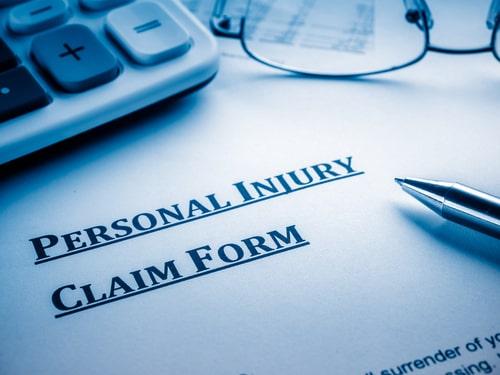Recent Blog Posts
Can I Sue for a Motorcycle Injury If I Did Not Wear a Helmet in Illinois?
 Motorcycle accidents are typically much more dangerous than car accidents. According to National Highway Traffic Safety Administration (NHTSA) data from 2022, motorcyclists were four times more likely to be injured in a crash than car passengers. They were also 22 times more likely to die. Even though motorcycles are a small minority of vehicles on the road, they accounted for 15 percent of all traffic deaths in 2022 with 6,218 fatalities.
Motorcycle accidents are typically much more dangerous than car accidents. According to National Highway Traffic Safety Administration (NHTSA) data from 2022, motorcyclists were four times more likely to be injured in a crash than car passengers. They were also 22 times more likely to die. Even though motorcycles are a small minority of vehicles on the road, they accounted for 15 percent of all traffic deaths in 2022 with 6,218 fatalities.
The main reason why motorcyclists experience more injuries and deaths in collisions is that they are less protected. Drivers and passengers in cars have airbags and seatbelts and are surrounded by a metal frame. Motorcyclists, on the other hand, have only protective gear to shield them in an accident. Failing to wear that gear is dangerous and can affect your ability to claim compensation for injuries in a crash.
Are Companies Liable for Injuries Their Employees Cause?
 Liability means legal responsibility. If a party is liable for damages, it means that the party is legally responsible for paying for the damages that were caused. If you want to be compensated for a personal injury, hire an Illinois personal injury attorney to bring a claim against whichever party is liable.
Liability means legal responsibility. If a party is liable for damages, it means that the party is legally responsible for paying for the damages that were caused. If you want to be compensated for a personal injury, hire an Illinois personal injury attorney to bring a claim against whichever party is liable.
It is important to know that the party who is liable is not always the party that caused the injury. If you are injured in a collision caused by a drunk teenage driver, for example, the parents might be liable for the injury even though it was caused by their child. Similarly, a company might be liable for an injury caused by its employee. This is called vicarious liability.
What Is Vicarious Liability?
Vicarious liability means that someone is legally responsible for an injury even though someone else caused it. It is based on a legal doctrine called “respondeat superior,” which is Latin for “let the master answer.”
Who Can I Sue if I Was Injured in a Bar Fight in Illinois?
 Illinois has a buzzing nightlife. There are over 1,600 nightclubs and bars in Chicago alone. But a side effect of any bustling night scene is an increase in violence, often fueled by alcohol. It is not uncommon for fights to break out in bars and clubs among partygoers after a couple of rounds of drinks. Unfortunately, these fights sometimes cause injuries — not only to the participants but also to innocent bystanders.
Illinois has a buzzing nightlife. There are over 1,600 nightclubs and bars in Chicago alone. But a side effect of any bustling night scene is an increase in violence, often fueled by alcohol. It is not uncommon for fights to break out in bars and clubs among partygoers after a couple of rounds of drinks. Unfortunately, these fights sometimes cause injuries — not only to the participants but also to innocent bystanders.
If you were injured in a bar fight, you are probably wondering who you can sue for damages. You might be able to sue the person in the fight who injured you. You also might be able to sue the establishment if you can prove that its management was negligent. Negligence means that the bar or nightclub managers did not take reasonable action to ensure the safety of patrons.
Is It Hard to Win a Wrongful Death Lawsuit?
 In the world of personal injury, some claims are easier to win than others. The level of difficulty depends on factors such as:
In the world of personal injury, some claims are easier to win than others. The level of difficulty depends on factors such as:
-
The severity of the injury
-
The amount of evidence
-
The competence of the personal injury attorney
When it comes to wrongful death claims, there are factors that make such lawsuits both easier and harder to win. On the one hand, a wrongful death lawsuit involves death, the worst kind of injury. On the other hand, some damages in a wrongful death lawsuit are harder to get compensation for because they are harder to prove.
What Is Wrongful Death?
According to the Illinois Wrongful Death Act, wrongful death happens when a person dies as a result of someone else’s “wrongful act, neglect or default.” One of the most common examples of a wrongful death is when a person is killed by a drunk driver. In a wrongful death case, relatives of the deceased victim sue the party who they believe is responsible for the death.
What Are the Four Elements of Negligence?
 When a person suffers a personal injury because of someone else, the injured party often wants compensation for damages that were caused. In many cases, this requires the victim to prove that the other party was negligent. Negligence means that the person who caused the injury did not take reasonable care to avoid causing damage.
When a person suffers a personal injury because of someone else, the injured party often wants compensation for damages that were caused. In many cases, this requires the victim to prove that the other party was negligent. Negligence means that the person who caused the injury did not take reasonable care to avoid causing damage.
Proving negligence can be a difficult task. If you are seeking compensation for damages, your Illinois personal injury attorney will need to prove the four elements of negligence:
-
Duty
-
Breach
-
Causation
-
Damages
This article will discuss the four elements of negligence and how they apply to personal injuries.
Duty of Care
The first element of negligence is showing that there was a duty of care. You need to prove that the defendant — the person who caused the injury — had a responsibility to take a certain amount of care to avoid the injury.
How Can I Prove Medical Malpractice?
 Medical malpractice — which is when a medical professional causes injury to a patient — is the third most common cause of death in the United States. Nearly 20,000 medical malpractice claims are filed each year, and medical errors are reported to cause 9.5% of all U.S. deaths annually. In 2022, the State of Illinois paid out $222 million for medical malpractice claims.
Medical malpractice — which is when a medical professional causes injury to a patient — is the third most common cause of death in the United States. Nearly 20,000 medical malpractice claims are filed each year, and medical errors are reported to cause 9.5% of all U.S. deaths annually. In 2022, the State of Illinois paid out $222 million for medical malpractice claims.
But even though it is not uncommon, medical malpractice is hard to prove without the help of an experienced Illinois medical malpractice attorney. This article will discuss some of the ways to prove that an injury was due to medical malpractice.
The Standard of Care Was Violated
Standard of care is a legal term that refers to the basic level of care expected from health professionals. It is what any qualified caregiver would be expected to do in a given circumstance. If you want to claim medical malpractice, one of the things you need to prove is that the medical professional breached the standard of care.
I Was Injured on Illinois State Property. Can I Sue the State?
 If you were injured on property belonging to the State of Illinois, you may be able to sue the state government. However, suing the government for an injury is not the same as suing a company or private individual. The rules for claiming damages are very different if you were injured by state property, so it is best to consult an Illinois personal injury attorney about your specific case.
If you were injured on property belonging to the State of Illinois, you may be able to sue the state government. However, suing the government for an injury is not the same as suing a company or private individual. The rules for claiming damages are very different if you were injured by state property, so it is best to consult an Illinois personal injury attorney about your specific case.
This article will discuss government liability for injuries and when you can claim damages from the Illinois state government.
What Are Some Examples of Government Liability?
Like people and corporations, governments are responsible — or liable — for damage caused by their property. Common cases in which the government might be liable for damages include:
- A person is injured because of a defect in a sidewalk maintained by the state.
What Kind of Compensation Can I Get After a Catastrophic Injury?
 Catastrophic injuries are injuries that have severe and life-long impacts, often impairing a victim’s ability to live life the way he or she is used to. They can also impact a victim's ability to earn future income. Catastrophic injuries may have long recovery times and result in serious medical bills, leading to an overwhelming situation for victims and their families.
Catastrophic injuries are injuries that have severe and life-long impacts, often impairing a victim’s ability to live life the way he or she is used to. They can also impact a victim's ability to earn future income. Catastrophic injuries may have long recovery times and result in serious medical bills, leading to an overwhelming situation for victims and their families.
An experienced Illinois catastrophic injury lawyer can help you pursue a claim for compensation in court to recover damages that help you cover expenses related to your injury.
Common Types of Catastrophic Injuries
Catastrophic injuries occur in a variety of ways, though the most common incidents that lead to catastrophic injuries include construction or factory workplace accidents, trucking accidents, car and motorcycle accidents, and fire, explosion, or chemical burn accidents.
How Is Pain and Suffering Calculated in Illinois?
 When someone is hurt due to someone else’s actions, they can generally find legal justification to seek compensation for the associated costs from the person who caused the injury. Typical categories of damages include medical bills, income loss, and something known as “pain and suffering.” While medical bills and income loss are typically objective and calculated based on the bottom line of a medical bill or a missed salary, pain and suffering are more subjective. A knowledgeable Springfield, IL personal injury attorney can answer your questions about how pain and suffering might be calculated in your case.
When someone is hurt due to someone else’s actions, they can generally find legal justification to seek compensation for the associated costs from the person who caused the injury. Typical categories of damages include medical bills, income loss, and something known as “pain and suffering.” While medical bills and income loss are typically objective and calculated based on the bottom line of a medical bill or a missed salary, pain and suffering are more subjective. A knowledgeable Springfield, IL personal injury attorney can answer your questions about how pain and suffering might be calculated in your case.
What Does “Pain and Suffering” Cover?
Pain and suffering is a category that covers many aspects of the consequences of an injury. A qualified personal injury lawyer should be able to advocate for your rights and demonstrate that you are entitled to compensation for the mah parts of your life that have been affected by the incident in question. These include:
3 Steps to Follow if You Are Injured in a Workplace Accident
 Workplace accidents can fall anywhere on a wide range of severity. You could slip in a puddle in the office bathroom, fall off a broken desk chair, have improperly secured equipment fall on you, and more. Whatever happens, there are some steps you should take on the day of the accident that can help your workers’ compensation claim get processed more smoothly. This article will explain some of the steps, but if you are involved in a workplace accident, you should speak with a skilled Springfield, IL workers’ compensation attorney who can advise you on what to do next.
Workplace accidents can fall anywhere on a wide range of severity. You could slip in a puddle in the office bathroom, fall off a broken desk chair, have improperly secured equipment fall on you, and more. Whatever happens, there are some steps you should take on the day of the accident that can help your workers’ compensation claim get processed more smoothly. This article will explain some of the steps, but if you are involved in a workplace accident, you should speak with a skilled Springfield, IL workers’ compensation attorney who can advise you on what to do next.
Step 1: Seek Medical Attention
Whether you require an ambulance and paramedics and need to get ushered into the emergency room or your injuries are less urgent and you just need to be examined to make sure you are not letting any issue go unnoticed, the first thing you should do if you are involved in a workplace accident is to seek medical attention. Do not wait till your work day is over. This will help in two ways: First, it means you are getting the treatment you need, and second, it means there will be documentation and medical records of your injury, which can be used as evidence of your claims later on.









